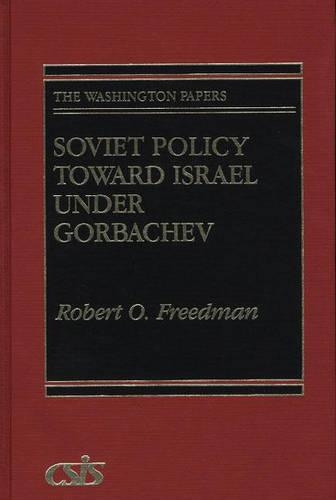
Soviet Policy Toward Israel Under Gorbachev
(Hardback)
Available Formats
Publishing Details
Soviet Policy Toward Israel Under Gorbachev
By (Author) Robert Owen Freedman
Bloomsbury Publishing PLC
Praeger Publishers Inc
30th April 1991
United States
Classifications
Tertiary Education
Non Fiction
Central / national / federal government policies
327.4705694
Physical Properties
Hardback
160
Description
Mikhail Gorbachev's rise to power in 1985 signalled the beginning of significant improvements in Soviet-Israeli relations. Based on analysis of Soviet behaviour and interviews with Israeli and Soviet Foreign Ministry officials and PLO leaders, this study describes how eased tensions between the Soviet Union and Israel have been achieved, and analyzes the Soviet Union's reasons for advancing diplomatic relations with Israel. Robert Owen Freedman follows the progress of Soviet policy from the 1987 arrival of the Soviet consular delegation in Israel, which heralded rapid improvement on the diplomatic front, through 1989 trade agreements, cultural, academic, and athletic exchanges, and 1990 political meetings between high ranking officials. Freedman's identification of the four primary goals which positively directed these Soviet initiatives towards Israel is central to the study as it recognizes the Soviet desire to become active in the Middle East peace process and to favourably influence domestic and worldwide opinion. Both meticulously documented and forward-looking, the conclusions reached can stimulate discussion and provide a basis for further study for members of the academic, political, and diplomatic communities.
Reviews
For decades, US Middle East policy had three objectives: denying the Soviet Union any major strategic presence, keeping the oil flowing the the worlds' free nations, and helping insure Israel against catastrophic defeat. For decades, the Soviet Union undermined US efforts by converting Arab-Israeli tensions into anti-Western political forces. Instead of cooperating, the great powers competed, arms increased, and tensions rose. After summarizing that rivalry, Freedman explains Gorbachev's movement into a new, positive relationship with Israel. He reveals links between Gorbachev's Middle East policy and his main foreign policy goal: obtaining Western support for Soviet domestic economic and political reform. Perestroika was redefining Soviet national interests; decades of hostility towards Israel were being reversed. Soviet-American-Israeli cooperation sharply increased Soviet-Jewish immigration to Israel while helping the Soviet Union gain vital Western support. Freedman provides an incisive, succinct, and important history of the Soviet-Israeli rapprochement. His clear analysis sets the background for the Soviet-American cooperation that would follow in the Persian Gulf crisis of 1990-91 and the Middle East peace conferences of 1991-92. An excellent volume for public libraries and academic collections.-Choice
Freedman is a sure guide through the maze of Middle East politics and superpower diplomacy. Robert Freedman's excellent study is both judicious and probing and is essential reading for anyone attempting to understand the Middle East political quagmire. Those concerned about Moscow's continuing actions would be well advised to read Freedman's concise but cogent volume.-Shofar
"Freedman is a sure guide through the maze of Middle East politics and superpower diplomacy. Robert Freedman's excellent study is both judicious and probing and is essential reading for anyone attempting to understand the Middle East political quagmire. Those concerned about Moscow's continuing actions would be well advised to read Freedman's concise but cogent volume."-Shofar
"For decades, US Middle East policy had three objectives: denying the Soviet Union any major strategic presence, keeping the oil flowing the the worlds' free nations, and helping insure Israel against catastrophic defeat. For decades, the Soviet Union undermined US efforts by converting Arab-Israeli tensions into anti-Western political forces. Instead of cooperating, the great powers competed, arms increased, and tensions rose. After summarizing that rivalry, Freedman explains Gorbachev's movement into a new, positive relationship with Israel. He reveals links between Gorbachev's Middle East policy and his main foreign policy goal: obtaining Western support for Soviet domestic economic and political reform. Perestroika was redefining Soviet national interests; decades of hostility towards Israel were being reversed. Soviet-American-Israeli cooperation sharply increased Soviet-Jewish immigration to Israel while helping the Soviet Union gain vital Western support. Freedman provides an incisive, succinct, and important history of the Soviet-Israeli rapprochement. His clear analysis sets the background for the Soviet-American cooperation that would follow in the Persian Gulf crisis of 1990-91 and the Middle East peace conferences of 1991-92. An excellent volume for public libraries and academic collections."-Choice
Author Bio
ROBERT OWEN FREEDMAN is Peggy Meyerhoff Pearlstone Professor of Political Science and Dean of the School of Graduate Studies at the Baltimore Hebrew University. He is the author of Economic Warfare in the Communist Bloc: A Study of Soviet Economic Pressure against Yugoslavia, Albania, and Communist China (Praeger, 1970) and Soviet Policy toward the Middle East Since 1970 (Praeger, 1975). He has contributed to a number of edited books on the subject of Soviet foreign policy and Middle East politics, and has served on a number of U.S. delegations to the Soviet Union for discussions of Middle East issues.
